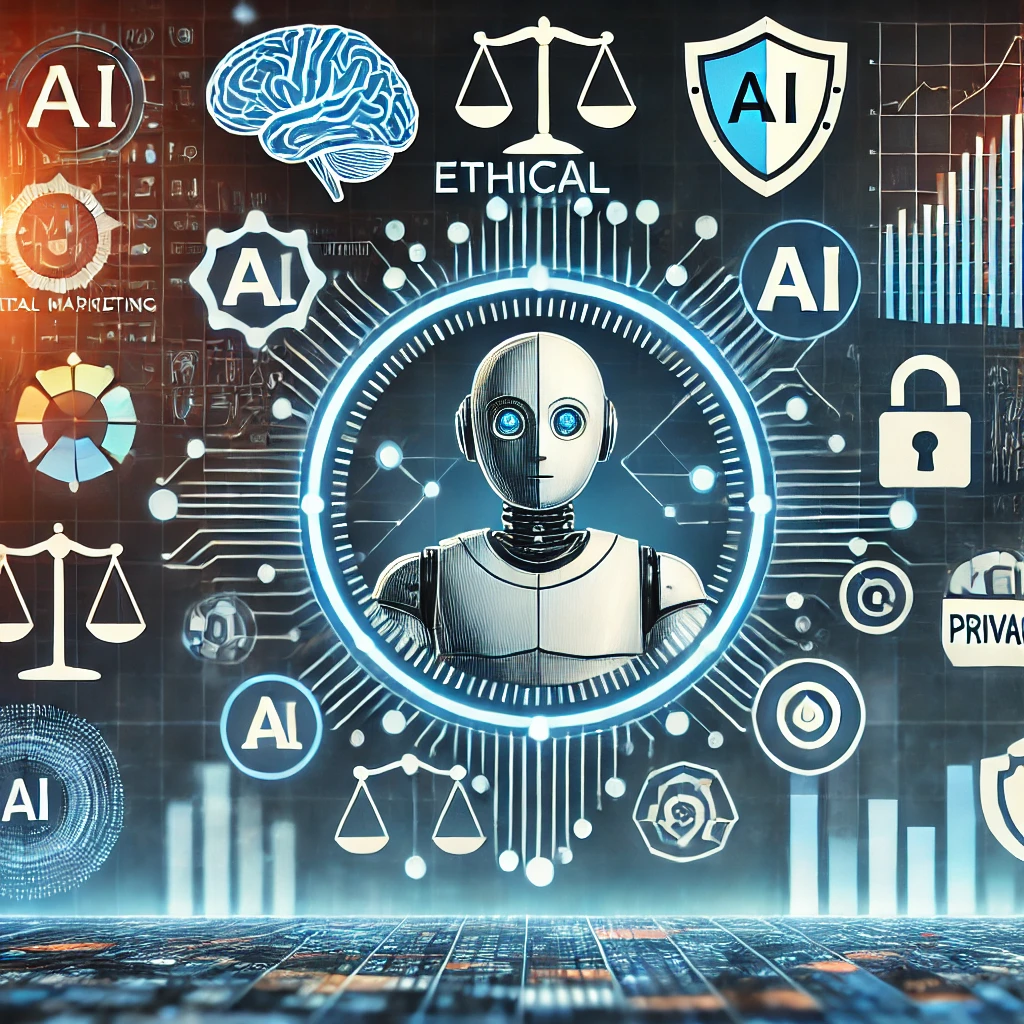1. The Development of Digital Marketing with Artificial Intelligence

With the ability to automate processes, forecast customer behavior, and provide individualized experiences at scale, artificial intelligence (AI) is completely changing digital marketing. From AI-driven ad targeting to chatbots and customer segmentation, companies leverage AI to reach audiences with greater precision. However, as AI becomes more embedded in marketing strategies, the importance of addressing ethical concerns grows. Implementing ethical AI in digital marketing ensures that while companies enjoy the benefits of this powerful technology, they also respect consumer rights and promote fairness.
2. The Ethical Difficulties in Marketing with AI

As AI transforms the marketing landscape, it brings several ethical challenges. One major issue is the potential for invading consumer privacy through the vast collection and analysis of personal data. Furthermore, the lack of transparency in AI algorithms can lead to manipulative marketing tactics that consumers don’t fully understand. Biases in AI models can also perpetuate unfair practices by targeting or excluding specific demographic groups. Addressing these issues is critical to ensure that ethical AI in digital marketing becomes the industry norm rather than an afterthought.
3. Data Privacy and Consumer Trust

An essential component of moral AI practices is data privacy. In digital marketing, AI systems often process large amounts of personal data to create highly tailored marketing campaigns. However, there may be trust violations if this data is gathered without the express agreement of the user or utilized inappropriately. To maintain ethical standards, companies must prioritize transparency, informing users how their data is collected, stored, and used. Ensuring ethical AI in digital marketing also means providing consumers with control over their data and respecting their privacy preferences, which builds long-term trust.
4. Transparency in AI-Driven Decisions
Transparency is essential in maintaining consumer confidence in AI technologies. In digital marketing, AI can drive decisions related to ad placements, content recommendations, and pricing. However, if consumers don’t understand how these decisions are made, it can lead to skepticism or frustration. Marketers should strive to make AI-driven processes clear and understandable, explaining why specific ads are shown or why content is personalized in a certain way. By embracing ethical AI in digital marketing, businesses can ensure transparency in their decision-making processes, fostering a stronger relationship with their audience.
5. Addressing Bias in AI Algorithms
One of the most pressing issues in AI is the potential for algorithmic bias, which can result in discriminatory marketing practices. For instance, an AI system might unfairly target ads to or exclude certain racial, gender, or socio-economic groups based on biased data. This can deepen social inequalities and harm a brand’s reputation. To promote ethical AI in digital marketing, companies must regularly audit their algorithms for biases, use diverse training datasets, and ensure that their marketing campaigns reach all audiences fairly and inclusively.
6. Rules and Guidelines for AI in Marketing That Is Ethical
Various regulations, like the General Data Protection Regulation (GDPR) in Europe, aim to protect consumer rights by setting standards for data collection, processing, and usage. These regulations serve as a framework for ethical AI in digital marketing, ensuring that companies follow legal and ethical guidelines when handling consumer data. Marketers need to stay updated on these regulations and implement compliance measures to avoid potential legal issues while demonstrating a commitment to ethical practices. Adhering to these standards is crucial for fostering trust and integrity in AI-powered marketing efforts.
7. Balancing Automation with Human Oversight
AI automation is incredibly useful for optimizing marketing strategies, but relying solely on AI without human oversight can lead to unintended consequences. For example, automated systems might push misleading or harmful ads without human review. To ensure ethical AI in digital marketing, there needs to be a balance between automation and human judgment. Marketers should monitor AI outputs, make adjustments where necessary, and ensure that AI tools are used to enhance—not replace—ethical decision-making in their marketing strategies.
8. AI for Good: How AI Can Improve Ethical Marketing
Despite its challenges, AI has the potential to be a force for good in digital marketing. It can be used to promote sustainability by optimizing ad campaigns for eco-friendly products or initiatives. It can also help businesses identify and target diverse audiences, supporting inclusivity and social responsibility. By aligning AI technologies with ethical principles, companies can contribute to a more positive impact on society. Ethical AI in digital marketing not only prevents harm but also encourages practices that benefit both businesses and consumers in meaningful ways.
9. Best Practices for Implementing Ethical AI in Digital Marketing
Implementing ethical AI in digital marketing requires companies to adopt several best practices:
- Data Minimization: Collect only the data necessary for marketing purposes to reduce the risk of data misuse.
- Algorithm Audits: Regularly audit AI systems to identify and mitigate biases.
- Consumer Consent: Prior to gathering or utilizing customer data, get express consent to ensure openness.
- Ongoing Education: Educate marketing teams on the ethical implications of AI to ensure that AI tools are used responsibly.
By incorporating these strategies, businesses can harness the full potential of AI while maintaining ethical standards.
10. The Marketing Potential of Ethical AI

The ethical issues that AI technology raises will only grow in complexity as time goes on. Looking ahead, marketers must be proactive in developing ethical frameworks that keep pace with technological advancements. Companies that prioritize ethical AI in digital marketing will be better positioned to build trust, stay compliant with regulations, and create marketing campaigns that resonate positively with consumers. The future of AI in marketing holds incredible potential, but only if ethics are placed at the forefront of innovation.
To learn more Click




